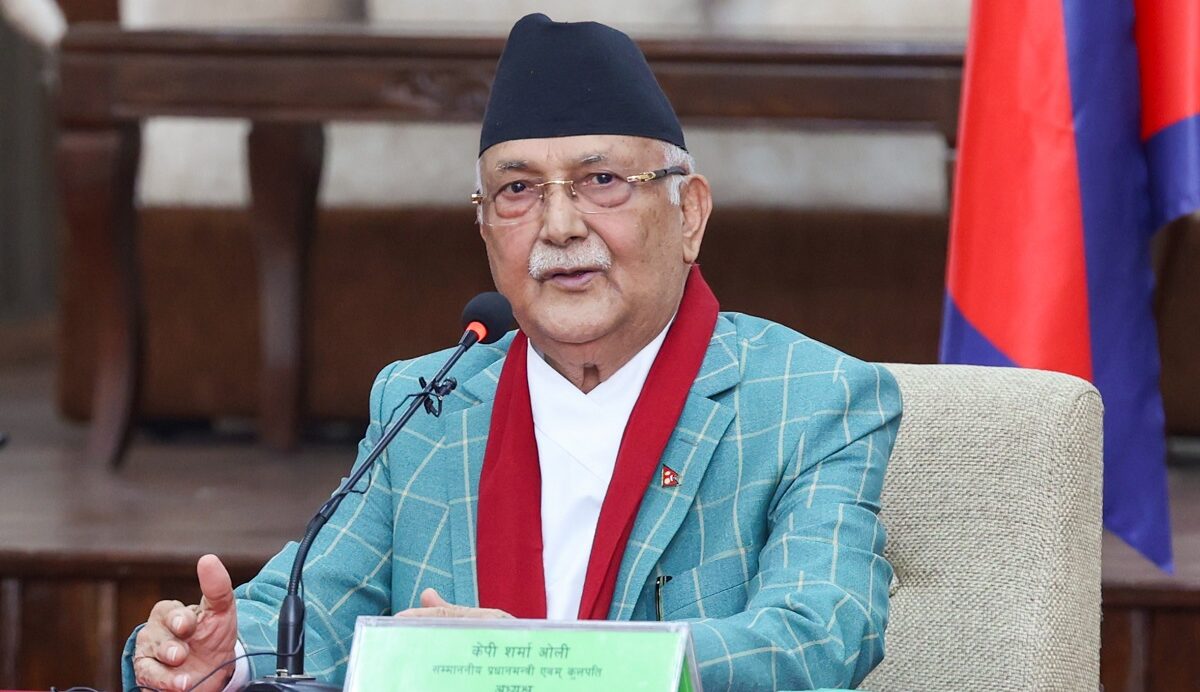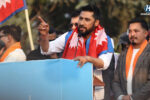KATHMANDU: Opposition parties, including the main opposition Maoist Centre, have concluded that the current government led by KP Sharma Oli has failed during its ‘honeymoon period.’
A joint meeting of opposition parties held on Friday at the call of former Prime Minister Pushpa Kamal Dahal, also the Chairman of the Maoist Centre, reached the consensus that the Oli government is not performing adequately.
As of now, the ‘honeymoon period’ for Prime Minister Oli’s government—counted from the day he took the oath of office before President Ram Chandra Paudel—will culminate on October 22, marking the completion of 100 days since the government was formed.
Prime Minister Oli was sworn in on July 15, having been appointed by President Paudel according to Article 76 (2) of the Constitution.
This marks Oli’s fourth term as Prime Minister, having replaced the then Prime Minister Dahal with the backing of the Nepali Congress, the largest party in parliament.
The two largest parties, the Nepali Congress and the UML, agreed to form a new coalition on June 1.
A week before he became Prime Minister for the fourth time, KP Oli publicly expressed support for major industrialists and business owners whose power lines had been cut due to non-payment of premium tariffs.
According to Shakti Basnet, Deputy Secretary General of the Maoist Centre, Friday’s joint meeting concluded that the government has failed and agreed to submit a memorandum addressing various public concerns.
Echoing the sentiments of the opposition, Dr. Ishwari Prasad Kandel, Head of the Central Department of Political Science at Tribhuvan University, also believes the Oli-led government has failed.
He points out that not only the current government but none of the previous administration have been successful in delivering results.
“In terms of performance, none of the previous governments have been able to do a good job,” Dr. Kandel told Khabarhub.
“The representatives sent with responsibility and prestige failed to meet public expectations.”
As the honeymoon period of the Oli-led government, perceived as a failure by both opposition parties and academics, approaches its end in three days, there are strong indicators regarding the government’s success or failure based on its initial performance.
In the 97 days since its formation, the Congress-UML alliance has become embroiled in several controversies. Among these, eight major ‘scandals’ are noteworthy:
Deputy Speaker Case
Less than two months after the government was formed under UML Chair Oli, the ruling coalition initiated a signature collection campaign aimed at removing Deputy Speaker Indira Rana Magar. However, this effort ultimately failed.
During a meeting on September 9 in Baluwatar, the ruling parties discussed the removal of Deputy Speaker Rana and began gathering signatures in preparation for a motion in the following day’s House of Representatives meeting.
Nepali Congress whip Sushila Thing, alongside UML parliamentary party chief whip Mahesh Bartaula, collected signatures during the meeting, although they did not officially confirm the proposal.
An MP from UML who signed the letter told Khabarhub that a proposal for Rana’s removal would soon be submitted based on the collected signatures.
On September 9, Prime Minister Oli proposed the removal of Deputy Speaker Rana, stating that it was a common resolution of the UML and Congress reached at the ruling party caucus in Baluwatar.
The strategy to remove Deputy Speaker Rana stemmed from his lack of majority support in the Constitutional Council.
As per constitutional provisions, the Prime Minister serves as the chair of the Constitutional Council, which operates by majority decision.
The members of the Constitutional Council include the Chief Justice, the Speaker, the Speaker of the National Assembly, the Leader of the Opposition, and the Deputy Speaker.
Among these members, the main opposition leader Prachanda, National Assembly Speaker Narayan Dahal, and Deputy Speaker Rana are from the opposition.
Following his appointment on July 14, Prime Minister Oli received support from more than two-thirds of the MPs during a vote of confidence in the House of Representatives.
A two-thirds majority in the 275-member House requires the backing of 184 MPs.
This public criticism marked the beginning of a rift between Balen and Oli, which widened after UML state assembly member Rekha Sharma faced allegations of exploiting child labor.
He secured 188 votes. However, Prime Minister Oli decided to back off from pursuing the removal of Deputy Speaker Rana for the time being, as securing the necessary two-thirds majority for such a motion appeared unlikely.
Kulman Ghising Case
A week before he became Prime Minister for the fourth time, KP Oli publicly expressed support for major industrialists and business owners whose power lines had been cut due to non-payment of premium tariffs.
On July 9, the Nepal Electricity Authority cut off power to Pashupati Murarka’s Arghakhanchi Cement, Pawan Golyan’s Reliance Spinning Mill, and the Ghorahi Cement industry owned by the Shanghai Group.
This action was taken because these industries had not paid for the electricity consumed from dedicated feeders and trunk lines during a period of severe load shedding across the country.
However, just five days after taking office, Prime Minister Oli ordered that power be restored to the affected industries.
On July 19, he summoned Energy Minister Deepak Khadka, Industries Minister Damodar Bhandari, and Nepal Electricity Authority (NEA) Managing Director Kulman Ghising in the presence of industrialists and traders, instructing them to reconnect electricity to several industries that had their power cut due to non-payment.
Despite Oli’s verbal decree, aimed at waiving over 8 billion rupees in unpaid electricity tariffs, the directive failed to materialize.
The Electricity Authority requested a written order from the government and a formal decision from its board meeting, rendering the Prime Minister’s urgent request ineffective.
Tensions with Kathmandu Mayor Balen
Following his appointment as Prime Minister for the fourth time, Oli has faced increasing friction with Balendra Shah (commonly known as Balen), the Mayor of Kathmandu Metropolitan City.
Balen, who approached Oli for advice on the metropolis’s development without winning the election, has recently grown more assertive in his criticisms of the Prime Minister.
The deterioration in their relationship began after Balen publicly thanked Senior Advocate Om Prakash Aryal, the legal advisor to the metropolis, following a Supreme Court ruling regarding the land of Giribandhu Tea-Estate.
Balen posted on Facebook, accompanied by a photo with Aryal, stating that the previous Oli-led government’s decision to exchange nearly 344 bighas of Giribandhu land in Jhapa was “completely unfair, immature, and subject to loan conditions,” and asserted that the government should reclaim the land if the original purpose for granting it expired.
During a question-and-answer session, he displayed a sense of arrogance regarding his visit to America, saying, “Did I go to America to get buffalo milk? Our problems and thoughts were presented there; they were acknowledged.”
This public criticism marked the beginning of a rift between Balen and Oli, which widened after UML state assembly member Rekha Sharma faced allegations of exploiting child labor.
Balen’s Secretariat believes that following his Facebook post celebrating a legal victory regarding the Giribandhu verdict, pressure from UML leaders and activists intensified, further straining their relationship.
Distress among flood victims
In the last week of September, a series of landslides and floods caused by three days of relentless rain resulted in the deaths of 246 individuals.
The disaster impacted the Bagmati, Gandaki, Koshi, Madhesh, and Lumbini provinces, injuring 178 others, with the condition of 18 people still unknown.
In the Kathmandu Valley alone, 70 people lost their lives, with an additional 37 injured and 6 reported missing.
The government faced widespread criticism after the tragedy, particularly as the Prime Minister was in the United States when the floods and landslides struck the nation.
Near the housing area for ministers at Bhainsepati in Lalitpur, five individuals were stranded on a tin roof due to flooding from the Nakhkhu River and pleaded for rescue for four hours.
Two of those swept away were rescued by Chaniklal Tamang from Kavre, while one managed to swim to safety. However, two others went missing.
The government’s failure to conduct timely helicopter rescues drew significant public outrage.
Home Minister Ramesh Lekhak attempted to deflect blame, claiming that helicopter rescues were not possible due to poor visibility.
Amid the flood crisis, many citizens expected Prime Minister Oli to shorten his trip to America and return swiftly.
However, he arrived back in Kathmandu two days after the disaster, on September 30, following his attendance at the 79th General Assembly of the United Nations.
Upon his return, he suggested that protests against the government’s handling of the flood were unwarranted.
I returned and heard that the government’s presence was lacking during the calamity.
A seven-point agreement was reached on June 1 between the two major parties in the House of Representatives, the Nepali Congress and the UML, to form the government.
“Don’t protest just for the sake of protesting,” Oli stated. “The government has tried its best. The army and police have been deployed, and rescue and relief operations are underway. We could not have stopped the flood.”
Oli argued that even though the Weather Forecast Division predicts floods and landslides, no one can pinpoint where they will cause damage.
During a question-and-answer session, he displayed a sense of arrogance regarding his visit to America, saying, “Did I go to America to get buffalo milk? Our problems and thoughts were presented there; they were acknowledged.”
Hesitation in Implementing the Recommendations of the Parliamentary Committee
The government has yet to fully implement the report submitted by the parliamentary committee investigating misappropriations in cooperatives, which was presented on September 16.
Although the government forwarded the report, led by Chairman Surya Bahadur Thapa Chhetri, to relevant ministries for action, not all individuals recommended for action by the committee have been apprehended.
The committee recommended action against Ravi Lamichhane, chairman of the Rastriya Swatantra Party (RSP), Kumar Ramtel, Secretary of Suryadarshan Cooperative, Chabilal Joshi, former director of Gorkha Media Network, and GB Rai, owner of Gorkha Media, for their roles in transferring cooperative funds to Gorkha Media.
Of these individuals, GB Rai is currently absconding, and the government has not yet determined his whereabouts.
Only on Friday did they manage to arrest Rabi Lamichhane. Chabilal, a former DIG, is already in police custody, while Suryadarshan Cooperative Secretary Ramtel is serving time in jail.
Gift from Min Bahadur Gurung
On the occasion of Bada Dashain, Prime Minister KP Oli accepted nearly 11 annas of land from controversial businessman Min Bahadur Gurung for the establishment of a party office.
Industrialists and businessmen have expressed concerns that shrinking market demand is creating uncertainty within the product and supply chain.
He laid the foundation stone for the office building on this land on October 11.
A day earlier, during an executive meeting at the party headquarters in Chyasal, Lalitpur, Oli excitedly informed party members that approximately 11 acres of land would be received from a “well-wisher.”
However, he did not disclose the name of the landowner during the meeting.
The donation from the controversial businessman Gurung has sparked significant criticism of Oli from multiple sides within the UML.
Silence on Constitutional Amendment
A seven-point agreement was reached on June 1 between the two major parties in the House of Representatives, the Nepali Congress and the UML, to form the government.
This agreement identified constitutional amendment as a primary agenda.
However, ruling parties are currently confused about how and which articles of the constitution should be amended.
Opposition parties have accused the Oli-led government of pushing for constitutional amendments solely to maintain power.
Political parties appear to be divided on the amendment agenda, with those in power lobbying for changes while opposition parties remain opposed to altering the status quo.
Stagnant Economy
Despite Oli’s leadership over the past 100 days, economic challenges persist.
The stock market, which initially signaled positive trends, has recently experienced a significant decline.
Although banks have accumulated substantial investable liquidity, interest rates continue to drop due to a lack of loan disbursement.
Traders who imported goods on credit in anticipation of Dashain are now struggling with high-interest rates due to unsatisfactory sales.
Industrialists and businessmen have expressed concerns that shrinking market demand is creating uncertainty within the product and supply chain.









Comment